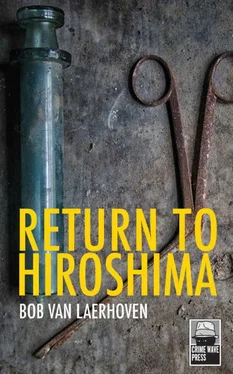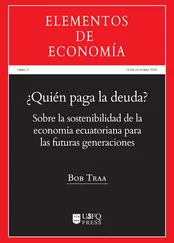The decline of the Suicide Club started when a number of its members joined Aum Shinrikyo. Reizo was against it at the start, but he soon realised that he was powerless to stop it. When the sect itself suggested he might become a member – with the prospect of speedy advancement – he took the bait. His competitive instincts were aroused by the fact that many young Aum Shinrikyo members had degrees from prominent universities yet still venerated the radical ideas of its founder Shoko Asahara. From the outset, Reizo was intent on climbing the hierarchical ladder whatever the cost, but in spite of the promises they had made him he hadn’t moved anywhere in the organisation, and certainly not upwards. His followers took note and abandoned him one by one. Before long the Suicide Club was facing money problems. At that point even his most faithful followers departed in silence.
Reizo stands at the window and notices the rear lights of a car driving off in the distance. He checks his nose, cautiously, convinced Mitsuko has broken it. He sees his dull reflection in the opal glass. He was always a handsome figure. He can’t bear the idea that his nose will no longer be a perfect feature. He has to be an immaculate, shiny machine. The tiniest blemish irks him intensely. He analyses his subdued despondency and comes to the conclusion that he’s afraid of Mitsuko. The untamed temperament she keeps hidden under her hesitant and diffident exterior leaves him weak. All his life, Reizo has struggled with an inner self that mocked him and belittled him. He has no idea where it came from. His contempt for the world is a result of the self-hatred that devours him. When he was fourteen, he read about the troubled youth of Yukio Mishima who had been abused by his parents. It only served to stoke Reizo’s inexplicable aversion to his own absent but gentle parents, although there was no reason for it. When he was small, his father had never threatened to throw him in front of a passing train, although Reizo later imagined he had to make him feel more like his great idol Mishima. He had never been forced to play with girls and he didn’t have a tyrannical and violent grandmother. When he looked at himself in the mirror he saw Reizo Shiga alias Joe Bloggs. The youth decided to learn kendo, the sport at which Mishima had excelled, but he found it hard to control his aggression and would smash his bamboo practice sword to pieces whenever he lost a duel. He was thrown out of the kendo club, but came to treasure the rejection as evidence of his superiority. He started to read Mishima’s essays, and although he didn’t understand much of what he read, he quickly understood that he was eloquent enough to use a couple of Mishima’s core ideas to convince his peers of his special mission. Reizo dreamt of a Japan in which the younger people ruled the roost. A strong Japan that would rise to its predestined place at the head of all the other nations. He embraced Mishima’s conviction that politics was a rat’s nest and that the only thing that could give a life meaning and depth was a glorious death. He imagined a society in which everyone would opt for an idealistic and honourable suicide when they reached the age of twenty-five. From the age of seventeen, Reizo had dressed in military black. He was like a magnet to other young people and he enjoyed the times he was able to manipulate them. He had moments of euphoria, but his character tended on the whole to be melancholic. He didn’t fantasise about sex, instead he pictured himself fighting heroic duels. He would cut it fine but always win, and then he would die from his wounds. There was often a homo-erotic tint to his daydreams, but he would never acknowledge that side of his character. Men were blood brothers, women were for slapping around. That’s what real men did. Reizo developed a fascination for porn in which the act of penetration was speeded up so that the actresses looked like inflatable dolls rolling back and forward on the bed. He was turned on by close-ups of faces twisted with pain. He loved to see the actors slap their partners’ breasts or take them from behind. The orgasmic explosion it gave him wasn’t lust, it was more like an overwhelming wave of physical energy, like having power over life and death. Reizo had the constant feeling he had been saddled with an immense hunger that could never be satisfied. He looked down on the popular mangas and assumed an arrogant artistic air, but in reality he was obsessed with comic books featuring aliens with supernatural powers. He was ashamed that he was human, a weak creature with unforgivable flaws in its basic design. He was plagued by an unbearable sense of his own triviality. Drugs were the only way to escape it. Cocaine turned him into a superman. But the euphoria only lasted half an hour, then he would crash into the ink-black darkness of self-humiliation. His frustration grew. He tried time and again to push back his boundaries. The things he didn’t dare were the most attractive. The challenges he set himself became more and more grotesque. Dare I disguise myself, stab my girlfriend, then drive her to hospital like an affectionate boyfriend? Do I dare expose someone to the potentially lethal sting of the Irukandji and note every detail of his last mortal hour to use in my novel? Do I dare lock up the daughter of a legendary mafia boss and force her to write down her life story, knowing that her father is looking for her and is holding out the prospect of a serious reward for finding her?
Every time Reizo realised what he had done, a fear took hold of him that thrust him upwards into a rage, a rage that would allow him to do something he had dreamt about for so long without daring to admit it to himself.
Hiroshima – Nagarekawa district – gay bar Splash – 1-23 Yagenbori – Takeda, Adachi, Yori and Becht – night, March 15 th1995
“800 yen for the first drink,” says the barman at Splash. Takeda only has to look at him to make him change his mind. “On the house, this time.” Takeda orders a beer. His body feels dehydrated. A memory is haunting him, throbbing with the intensity of a wound. Years ago he had staggered drunk one night into his wife’s bedroom. He can’t remember whether he wanted to have sex with her or ask for indigestion tablets. His wife was on her knees beside the bed, her eyes closed. When he asked what she was doing on her knees in the middle of the night, she said: “I’m talking with my heart, Akio.” It sounded so infantile that Takeda answered condescendingly: “And does your heart have anything interesting to say?” His wife tilted her head and looked at him, one of her usual understated if slightly accusatory looks. He’d seen it a thousand times. He often compared her expression with that of a cart horse: nervous, gentle, ready to run. He couldn’t have been more mistaken. Now, Takeda sees her eyes again and remembers with astonishment how they ploughed their way through the mud and mire of his embitterment and buried sadness. The inspector rubs his temples and shakes his head.
The other people in the bar – a chubby type with a girlish haircut and a skinny young man with slick, combed back hair – had been keeping a furtive eye on him since he arrived in the place, but now they turn their surprised attention to a trio of new arrivals: Dr Adachi and two women. Adachi gives Takeda a hug, completely out of character. Takeda is frozen to the spot. He catches sight of Beate Becht over Adachi’s shoulder. The German photographer reacts to his gaze as if she’s just been caught taking a picture of the embracing pair without permission.
“Akio,” Adachi whispers in the inspector’s ear. “I’m bitterly sorry. Why do I have to bring you such news?”
Takeda wriggles out of Adachi’s embrace without a word. His wife’s voice resounds in his ears as if the words she said that night are only now hitting home: “You should listen to your heart, Akio. Don’t let it turn to stone.”
Читать дальше












